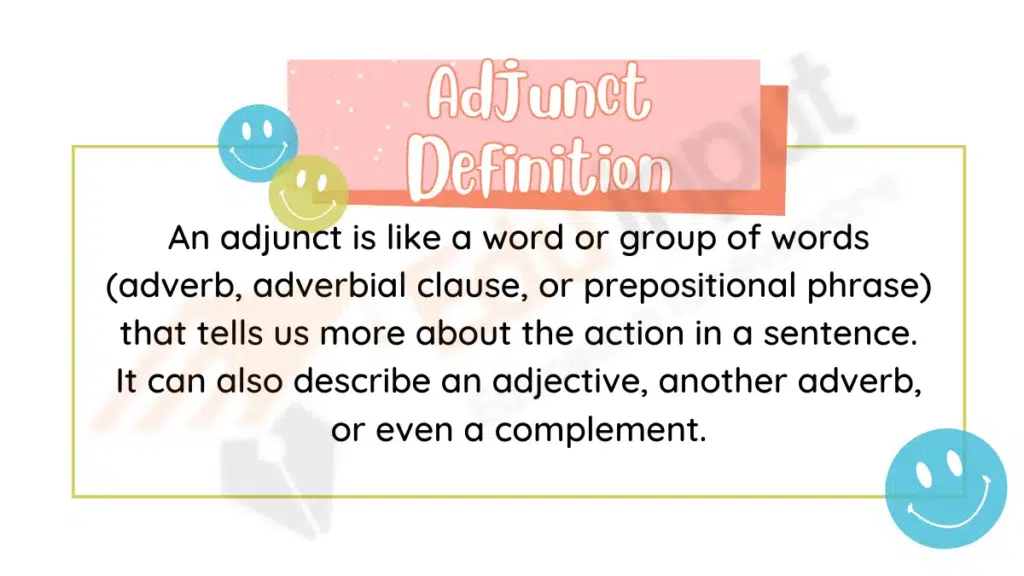Adjunct- Definition, Purpose, Usage and Examples
What Is an Adjunct? – Meaning and Definition
An adjunct is like a word or group of words (adverb, adverbial clause, or prepositional phrase) that tells us more about the action in a sentence. It can also describe an adjective, another adverb, or even a complement.

An adjunct is “an adverb or a phrase that adds meaning to the verb in a sentence,” and according to the Cambridge Dictionary, it’s “an adverb or phrase that gives extra information in a sentence.” The Collins Dictionary defines it as “a word or group of words that shows the circumstances of an action, event, or situation. It’s usually a prepositional phrase or an adverb group.”
The Merriam-Webster Dictionary gives us two definitions and tells us what it does. It says an adjunct is “a word or group of words that explains or completes the meaning of another word or words and is not the main part of the sentence,” and “an adverb or adverbial phrase (like heartily in ‘They ate heartily’ or at noon in ‘We left at noon’) connected to the verb of a clause to show a relation of time, place, frequency, degree, or manner.”
When, Where and Why Use Adjuncts in a Sentence?
An adjunct is like a sentence superhero that adds extra info about what’s happening. It spills the beans on when, where, why, how, and how often an action is going down. Think of it as the storyteller’s way of giving you the lowdown on a quality by saying how much.
Unlike the sentence stars (subject, verb, and object), adjuncts don’t have a fixed spot. They can pop up at the beginning, middle, or end of a sentence, depending on the info they’re sharing.
There’s no limit to the number of adjuncts a sentence can have. That’s why you see sentences with different structures like ASVA, SVOAA, ASVOA, SVAA, and more. Check out these examples to see how adjuncts jazz up sentences in all sorts of ways.
Examples of Adjuncts
Here are some examples of sentence structures with adjuncts for you to check out.
Examples of Adjuncts Answering the Question ‘How Often’
- They meet daily to discuss project updates.
- She goes to the gym twice a week to stay fit.
- We have a family dinner together every Sunday.
- He checks his email regularly for important updates.
- The students are required to submit assignments weekly.
Examples of Adjuncts Answering the Question ‘When’
- They usually go for a walk in the evening.
- The concert will start at 7 PM.
- We’ll meet for coffee tomorrow morning.
- She finished her work before lunch.
- The party is scheduled on Friday night.
Examples of Adjuncts Answering the Question ‘How’
- He completed the puzzle easily.
- She resolved the issue quickly.
- The team won the match strategically.
- They painted the room carefully.
- He lifted the heavy box with effort.
Examples of Adjuncts Answering the Question ‘Where’
- They met at the cafe to discuss the project.
- The treasure was buried under the old oak tree.
- We will have the picnic by the river.
- She found her keys in the kitchen.
- The children played in the backyard.
Examples of Adjuncts Answering the Question ‘Why’
- He missed the bus because his alarm didn’t go off.
- She studied diligently to ace her exams.
- The team lost the game because they were not well-prepared.
- They planted more trees in the neighborhood to improve air quality.
- She smiled happily because she received good news.
Examples of Sentences Containing Multiple Adjuncts
- They went to the beach yesterday to enjoy the sunshine in the afternoon.
- She completed the project meticulously despite feeling unwell on a busy Monday.
- The team practiced intensively for the upcoming match every day after school.
- He drove carefully through the city during heavy traffic to reach the airport on time.
- We celebrated joyfully with friends at a lively party after achieving our goal unexpectedly.



Leave a Reply